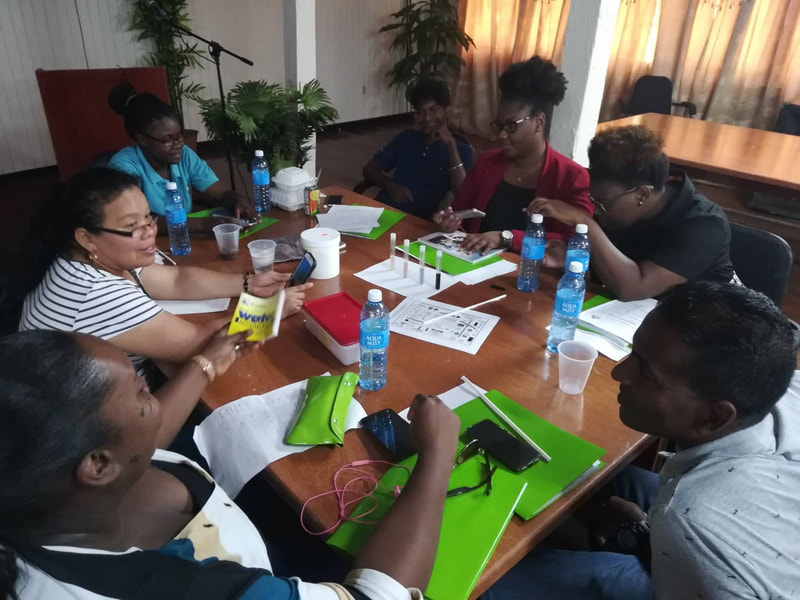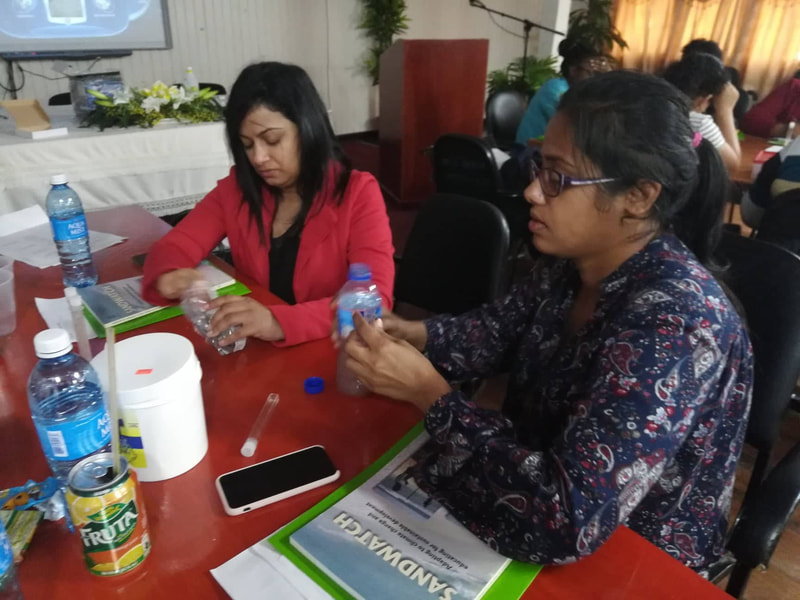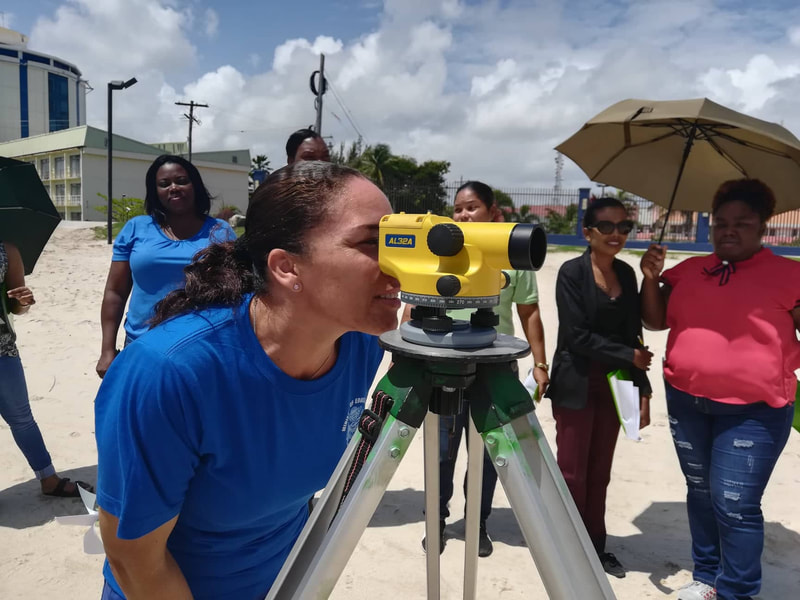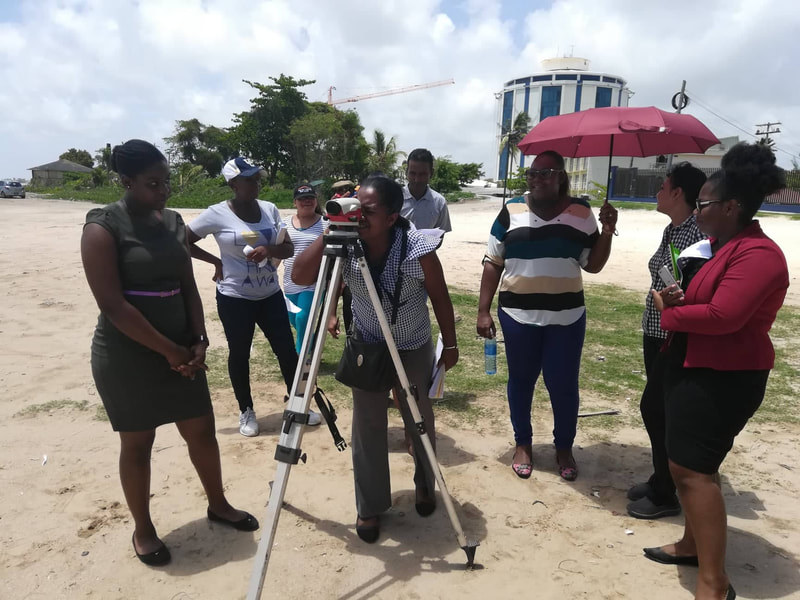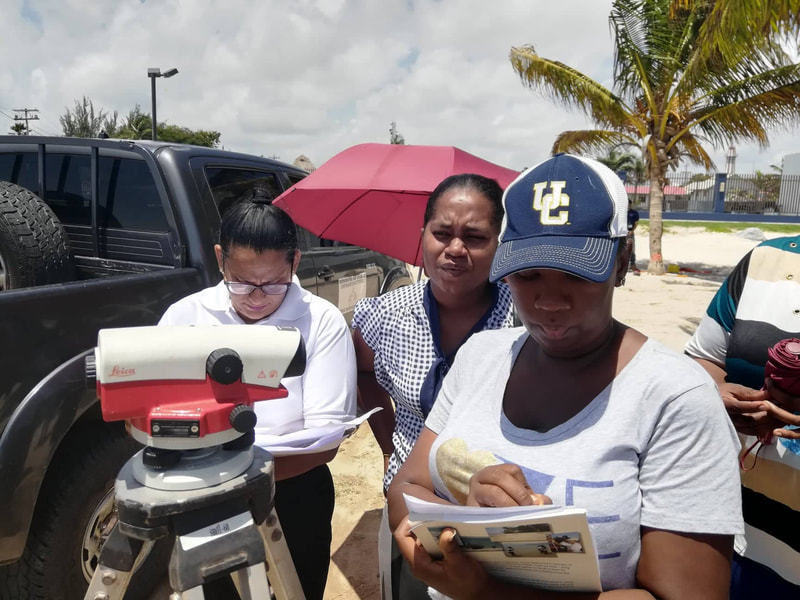Trainer-the-trainers Sandwatch Workshop held in Guyana
“Sandwatch: a combined approach to climate change adaptation and Education for Sustainable Development,” in Georgetown Guyana, from May 8 to 10, 2019.
As the world confronts the growing threat of climate change, there has to be a growing awareness and an action plan for our survival. And this is what we pledge to do, through Sandwatch. Sandwatch presents an opportunity to help citizens and ecosystems respond to present and future changes in a practical manner. We recognized that Sandwatch stands as an excellent example of Education for Sustainable Development in action. More so, Sandwatch helps people from all walks of life to learn about climate change and how their actions can contribute to the adaptation process.
To this extent, the Ministry of Education, Guyana National Center for Educational Resource Development (NCERD) in collaboration with Trinidad and Tobago Sandwatch Network, conducted a workshop, “Sandwatch: a combined approach to climate change adaptation and Education for Sustainable Development,” in Georgetown Guyana, from May 8 to 10, 2019.
The aim of the workshop was to discuss the value of citizen science in achieving the Sustainable Development Goals, and to provide training on Sandwatch, which is a UNESCO’s flagship programme for Small Island Developing States (SIDS). In addition, the workshop aimed to launch, strengthen and consolidate the Sandwatch networks, both within Guyana and Trinidad & Tobago. This report will provide a summary of the outcomes for the activities on each day of the workshop.
Thirty participants, ranging from primary, secondary and tertiary educators from Guyana and Trinidad & Tobago, inclusive of undergraduate students from the University of the Guyana (UG) and two lecturers from the University of Trinidad and Tobago were fully engaged throughout the workshop. The main facilitators were Andy Paul from Trinidad and Tobago and Ms Petal Jetoo, Director of NCERD and ably assisted by a Sandwatch Team from Trinidad and Tobago.
The plenary sessions focused on the following:
The Sandwatch Programme
- Education for Sustainable Development through Sandwatch
- An overview of the Sandwatch Manual
- Opportunities for collaborations and implementation of Sandwatch Programme in schools.
- Lesson Planning : The 5E Model
- An introduction to Ocean School Literacy and its integration with the Sandwatch Programme
- Science of Climate Change
- Man and the Biosphere Programme (MAB)
What made this workshop a very exciting, memorable and successful one were the hands-on components or the practical sessions. Participants were fully engaged in all elements of Sandwatch and were aroused on how engaging and curriculum based Sandwatch is. Indeed it is making learning fun and giving students opportunities to foster critical thinking skills. It is making science alive.
Participants were very thankful for the assistance of the Engineers from the Guyana’s Ministry of Public Infrastructure, who along with Mr Paul guided participants in the standardized method if assessing a beach profile. Truly amazing and edifying.
During the workshop we were also introduced to a new concept called Ocean School. This is a unique and creative way of using the ocean as a teaching tool, combined with google classroom. I would urge UNESCO to broaden this concept to more of the teachers in the Caribbean. This methodology will cause a paradigm shift in education and improve students’ learning.
Mr. Paul’s presentations continually reminded us that it is time for action. If we do not do something now, what we have today will no longer be there tomorrow, for the future generations to enjoy. It is indeed Stop the talk, Time for Action. This all participants have pledge to be and do. We must not sit idly by, for indeed “Sandwatch is me, sandwatch is you, sandwatch is all ah wee.
It was a very rewarding, fulfilling and successful workshop, one I wish more teachers were exposed to. Sandwatch really provides a framework for children, youth and adults, with the help of teachers and local communities, to work together to scientifically monitor and critically evaluate problems and conflicts facing their beach environments and to design and implement activities and projects to address some of those issues, whilst also enhancing the beach environment and building ecosystem resilience to climate change.
We look forward to the possibilities of what Sandwatch cater, as we excitedly anticipate the possible twining of schools, especially those between Guyana and Trinidad and Tobago. Specially thanks to our facilitators and those who conceptualized and collaborated to have this memorable Sandwatch Workshop. We look forward to future collaborations, even throughout the Caribbean as we continue to fly the Sandwatch flag.
- Mr. Andy Paul, Sandwatch National Coordinator, Trinidad & Tobago
As the world confronts the growing threat of climate change, there has to be a growing awareness and an action plan for our survival. And this is what we pledge to do, through Sandwatch. Sandwatch presents an opportunity to help citizens and ecosystems respond to present and future changes in a practical manner. We recognized that Sandwatch stands as an excellent example of Education for Sustainable Development in action. More so, Sandwatch helps people from all walks of life to learn about climate change and how their actions can contribute to the adaptation process.
To this extent, the Ministry of Education, Guyana National Center for Educational Resource Development (NCERD) in collaboration with Trinidad and Tobago Sandwatch Network, conducted a workshop, “Sandwatch: a combined approach to climate change adaptation and Education for Sustainable Development,” in Georgetown Guyana, from May 8 to 10, 2019.
The aim of the workshop was to discuss the value of citizen science in achieving the Sustainable Development Goals, and to provide training on Sandwatch, which is a UNESCO’s flagship programme for Small Island Developing States (SIDS). In addition, the workshop aimed to launch, strengthen and consolidate the Sandwatch networks, both within Guyana and Trinidad & Tobago. This report will provide a summary of the outcomes for the activities on each day of the workshop.
Thirty participants, ranging from primary, secondary and tertiary educators from Guyana and Trinidad & Tobago, inclusive of undergraduate students from the University of the Guyana (UG) and two lecturers from the University of Trinidad and Tobago were fully engaged throughout the workshop. The main facilitators were Andy Paul from Trinidad and Tobago and Ms Petal Jetoo, Director of NCERD and ably assisted by a Sandwatch Team from Trinidad and Tobago.
The plenary sessions focused on the following:
The Sandwatch Programme
- Education for Sustainable Development through Sandwatch
- An overview of the Sandwatch Manual
- Opportunities for collaborations and implementation of Sandwatch Programme in schools.
- Lesson Planning : The 5E Model
- An introduction to Ocean School Literacy and its integration with the Sandwatch Programme
- Science of Climate Change
- Man and the Biosphere Programme (MAB)
What made this workshop a very exciting, memorable and successful one were the hands-on components or the practical sessions. Participants were fully engaged in all elements of Sandwatch and were aroused on how engaging and curriculum based Sandwatch is. Indeed it is making learning fun and giving students opportunities to foster critical thinking skills. It is making science alive.
Participants were very thankful for the assistance of the Engineers from the Guyana’s Ministry of Public Infrastructure, who along with Mr Paul guided participants in the standardized method if assessing a beach profile. Truly amazing and edifying.
During the workshop we were also introduced to a new concept called Ocean School. This is a unique and creative way of using the ocean as a teaching tool, combined with google classroom. I would urge UNESCO to broaden this concept to more of the teachers in the Caribbean. This methodology will cause a paradigm shift in education and improve students’ learning.
Mr. Paul’s presentations continually reminded us that it is time for action. If we do not do something now, what we have today will no longer be there tomorrow, for the future generations to enjoy. It is indeed Stop the talk, Time for Action. This all participants have pledge to be and do. We must not sit idly by, for indeed “Sandwatch is me, sandwatch is you, sandwatch is all ah wee.
It was a very rewarding, fulfilling and successful workshop, one I wish more teachers were exposed to. Sandwatch really provides a framework for children, youth and adults, with the help of teachers and local communities, to work together to scientifically monitor and critically evaluate problems and conflicts facing their beach environments and to design and implement activities and projects to address some of those issues, whilst also enhancing the beach environment and building ecosystem resilience to climate change.
We look forward to the possibilities of what Sandwatch cater, as we excitedly anticipate the possible twining of schools, especially those between Guyana and Trinidad and Tobago. Specially thanks to our facilitators and those who conceptualized and collaborated to have this memorable Sandwatch Workshop. We look forward to future collaborations, even throughout the Caribbean as we continue to fly the Sandwatch flag.
- Mr. Andy Paul, Sandwatch National Coordinator, Trinidad & Tobago
